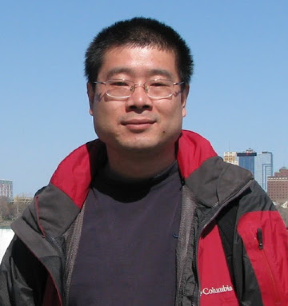Hao Luo, Ph.D., a post-doctoral associate in the Wayne State University Department of Otolaryngology-Head and Neck Surgery, has secured a grant from the Hearing Health Foundation to study whether electrical stimulation through cochlear implants can combat tinnitus.
Tinnitus is a sound sensation in the ear, head or brain that can range from a ringing noise to a high-pitched whining. As many as 50 million Americans have experienced tinnitus and as many as 9 million are inflicted with debilitating tinnitus. The condition can cause a wide range of distress and strongly correlates with anxiety, depression, insomnia and a decrease in cognitive functioning. The causes of tinnitus include noise exposure, age-related hearing loss and traumatic brain injury-related neurological disorder.
whining. As many as 50 million Americans have experienced tinnitus and as many as 9 million are inflicted with debilitating tinnitus. The condition can cause a wide range of distress and strongly correlates with anxiety, depression, insomnia and a decrease in cognitive functioning. The causes of tinnitus include noise exposure, age-related hearing loss and traumatic brain injury-related neurological disorder.
Numerous treatments have been attempted, including drugs, noise-masking, tinnitus retraining therapy neuromonics and electrical stimulation, but there still is no cure for the condition.
Electrical stimulation via cochlear implants, which are designed and used for hearing restoration, have been found promising in alleviating tinnitus symptoms, Dr. Luo said, but cochlear electrical stimulation, or CES, has not been specifically designed and used to manage tinnitus.
The one-year grant of $29,959 will fund Dr. Luo’s study, “Cochlear electrical stimulation induced tinnitus suppression and related neural activity change in the rat’s inferior colliculus.” He will develop a CES procedure in rats using cochlear implants and investigate whether CES can suppress tinnitus and identify the underlying neural mechanisms. Determining the mechanisms underlying CES-induced tinnitus suppression will provide information to help improve clinical trials and tinnitus management.
Clinically, CES via cochlear implantation has demonstrated promising results in alleviating tinnitus symptoms. However, cochlear implants and their speech processors are mainly designed for hearing restoration, and CES has not been specifically designed or used to manage tinnitus. CES-induced tinnitus suppression in patients is often short-lived and varies widely between individuals.
Dr. Luo hopes that a better understanding of the mechanism by which cochlear electrical stimulation suppresses tinnitus may shed the light on the development of more precise and effective tinnitus treatment through CES.
He works in the lab of Jinsheng Zhang, Ph.D., professor and associate chair for Research in the Department of Otolaryngology-Head and Neck Surgery, Communication Sciences and Disorders.